On December 8, 1963, two men abducted Frank Sinatra Jr. from a lounge in Nevada where he was performing — but one of his captors got nervous and released him just 48 hours later.
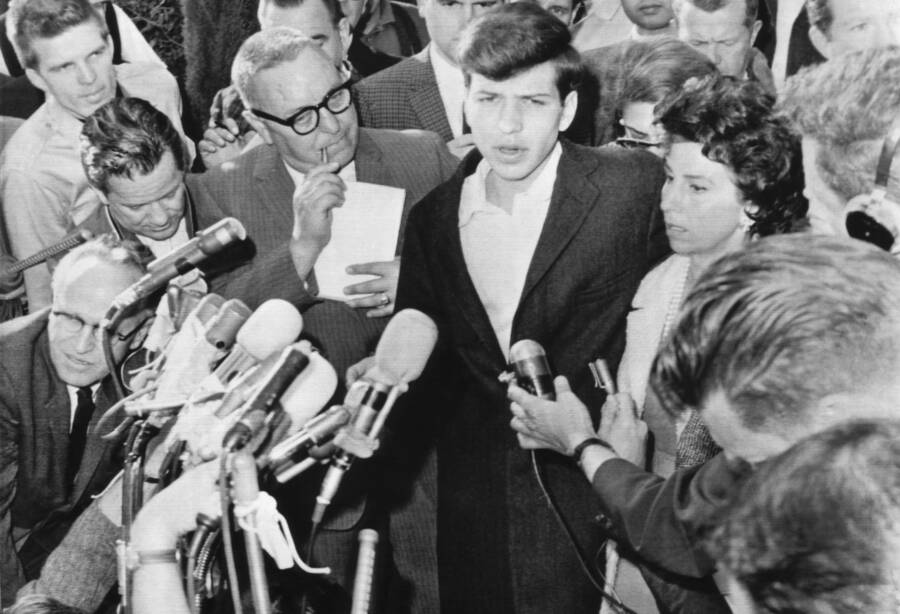
Everett Collection Inc / Alamy Stock PhotoFrank Sinatra Jr. with his mother Nancy after his kidnapping in December 1963.
In 1963, 23-year-old Barry Keenan was hopelessly broke and addicted to painkillers. He needed money — and quickly. So, he decided to kidnap a celebrity and demand a ransom. With the help of two accomplices, he pulled off the abduction of Frank Sinatra Jr., the 19-year-old son of Ol’ Blue Eyes himself.
At least, he almost did.
Keenan’s kidnapping scheme was flawed from the beginning, and it didn’t take long for the entire operation to fall apart. Just days after Frank Sinatra Jr. disappeared from a club near Lake Tahoe, he was found — safe and unharmed — walking through Bel Air.
Then, one of his kidnappers started to talk.
The Kidnapping Of Frank Sinatra Jr.
Barry Keenan was a UCLA student who’d gone to grade school with Frank Sinatra Jr.’s sister, Nancy. By 1963, Keenan was struggling with an addiction to painkillers following a car accident. He started thinking of ways to make money fast and came up with a kidnapping and ransom scheme. After some debate, he decided that 19-year-old Frank Sinatra Jr. could be the perfect candidate.
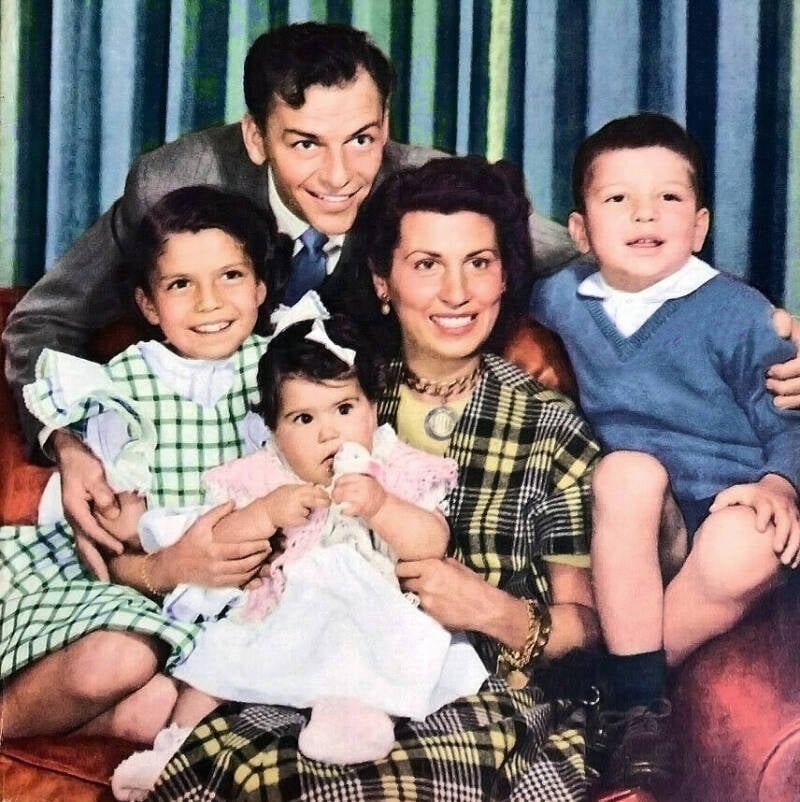
Public DomainFrank Sinatra, his first wife Nancy, and their children: Nancy, Tina, and Frank Sinatra Jr.
“I originally thought of Tony Hope, but Bob Hope had been very active with entertaining the troops and seemed like an all-around good guy. Kidnapping Tony didn’t seem like a very American thing to do,” Keenan explained to the Washington Post in 1998.
Keenan continued: “I decided upon Junior because Frank Sr. was tough, and I had friends whose parents were in show business, and I knew Frank always got his way. It wouldn’t be morally wrong to put him through a few hours of grief worrying about his son.”
According to Keenan, he did not intend to keep the money from the kidnapping of Frank Sinatra Jr. He planned to invest it, make enough to help himself and his family, and eventually pay it all back to Frank Sinatra Sr.
In any case, the first thing he needed was accomplices. Keenan tapped his high school friend, 23-year-old Joe Amsler, who was newly married and strapped for cash, and his mother’s ex-boyfriend, 42-year-old John Irwin.
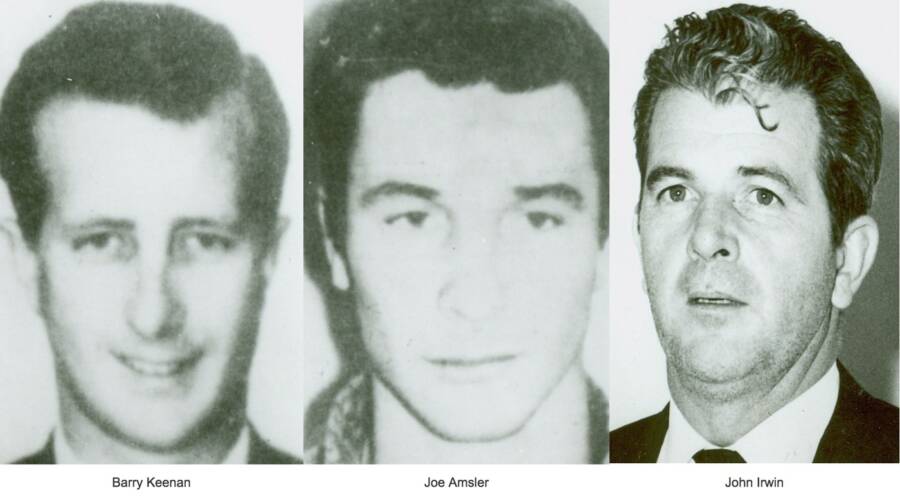
Federal Bureau of InvestigationBarry Keenan, Joe Amsler, and John Irwin were behind Frank Sinatra Jr.’s 1963 kidnapping.
After aborted attempts in Phoenix and Los Angeles, Keenan plotted for the kidnapping to take place on Nov. 22, 1963. However, the plan was foiled when President John F. Kennedy was assassinated that day in Dallas.
Instead, Keenan decided to abduct Frank Sinatra Jr. in Stateline, Nevada, on the shore of Lake Tahoe. Sinatra Jr. was trying to follow in his father’s footsteps and launch a music career, and the 19-year-old had a concert scheduled at Harrah’s Club Lodge. After that, he was going to Europe — which would mean the end of the plot.
However, the plan went wildly awry.
How The Abduction Of Frank Sinatra Jr. Fell Apart
On Dec. 8, 1963, Barry Keenan and Joe Amsler traveled to Harrah’s Club Lodge to kidnap Frank Sinatra Jr. Around 9 p.m., they knocked on the door of the room where Sinatra Jr. was eating chicken with John Foss, his trumpet player, before their evening show. Keenan and Amsler pretended to be making a delivery to gain entry to the room. Then, Keenan whipped out a gun and started making threats.
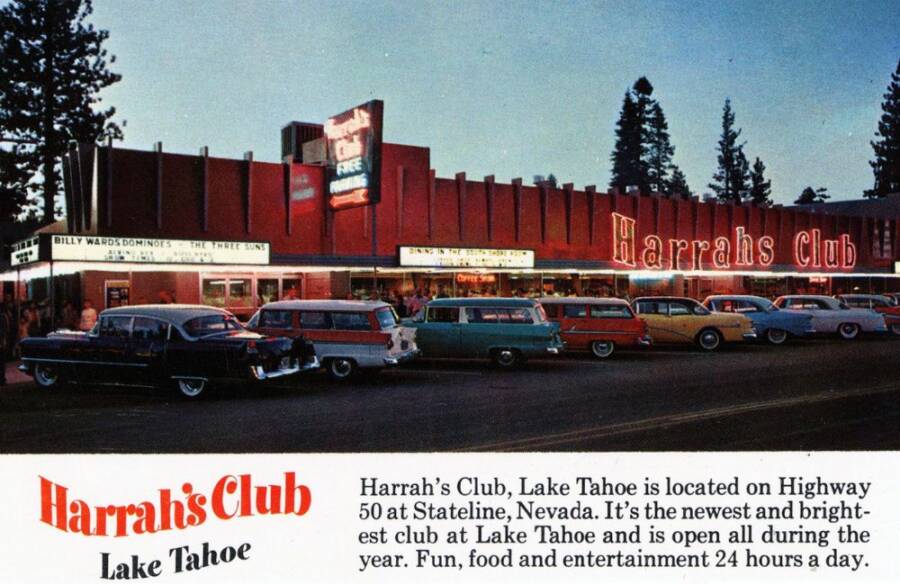
University of Nevada, RenoFrank Sinatra Jr. was set to perform at Harrah’s Club near Lake Tahoe the night he was abducted.
“I said, ‘Don’t make any noise and nobody’ll get hurt, don’t make any noise and nobody’ll get hurt,’ sort of like a stuck record,” Keenan told the Washington Post. “Then I started taking charge. I said, ‘Both of you get over and lie on the floor, this is a robbery. Where is your money?'”
Foss had no money; Sinatra Jr. had just $20. Keenan and Amsler took the cash and then bound Foss with adhesive tape. Pretending that they didn’t know who Sinatra Jr. was, they blindfolded him and took him down to their car.
However, Foss freed himself within minutes — and immediately notified the authorities. Despite this, Keenan and Amsler made their way through police roadblocks and brought Frank Sinatra Jr. to a quiet suburb of Los Angeles. There, Sinatra Jr. refused to cooperate by giving them his father’s phone number.
“Shoot me, beat me up, whatever,” Sinatra Jr. purportedly said. “I’m not giving you a phone number. I’m not scared of you guys.”
In fact, Frank Sinatra Jr.’s kidnappers didn’t need a phone number. They learned that Sinatra Sr. — with the assistance of Attorney General Robert Kennedy and mobster Sam Giancana — was working with the FBI and had set up headquarters at Mapes Hotel in Reno. They found the number for the hotel, and Irwin called Sinatra Sr. with instructions.
The captors demanded $240,000 in ransom. The FBI reports that on Dec. 10, Irwin told Sinatra Sr. to drop off the money between two school buses in Sepulveda, California. Early the next day, on Dec. 11, Sinatra Sr. complied.
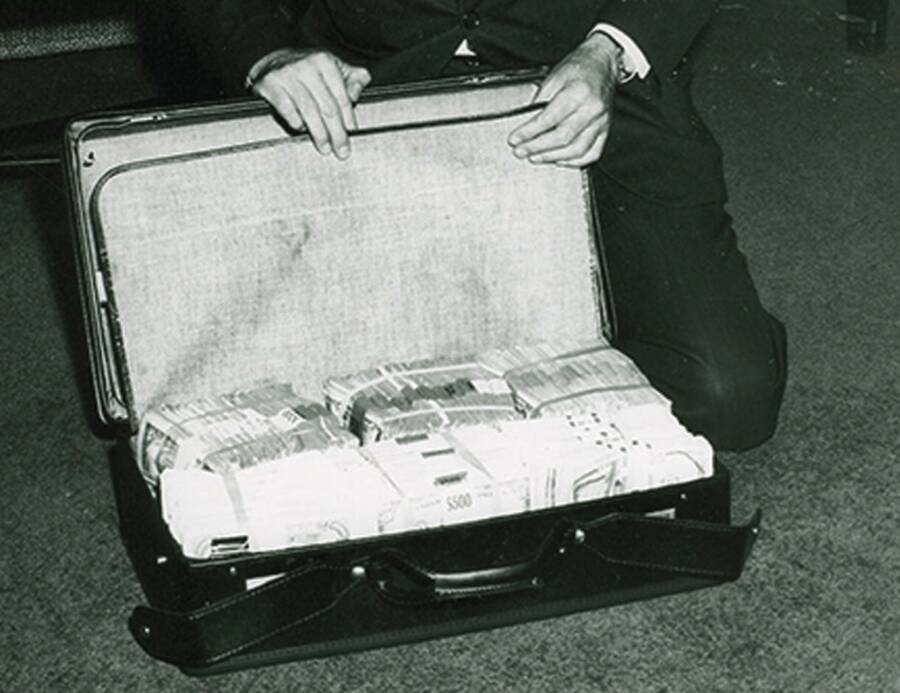
Federal Bureau of InvestigationThe $240,000 demanded by Frank Sinatra Jr.’s kidnappers. Keenan allegedly planned to invest the money and pay it back.
However, while Keenan and Amsler went to pick up the cash, Irwin started getting nervous about the whole plot. Rather than wait for his collaborators to return, he decided to let Sinatra Jr. go.
Frank Sinatra Jr. was found a few miles away in Bel Air in the early morning hours of Dec. 11. He walked up to a security guard, who put the teen in the trunk of his car to avoid the press and drove him to his mother Nancy’s house.
Though their victim had escaped, the kidnapping had never really been the point of the plot. Keenan, Amsler, and Irwin celebrated the successful ransom with glee as Sinatra Jr. was reunited with his family.
“We laid all the money out, danced on it, lit cigarettes with it, did all the things we’d seen in the movies,” Keenan told the Washington Post. “We had a money war, throwing wads of bills at each other.”
But it wouldn’t take long for the FBI to track the kidnappers down.
The Aftermath Of The Failed Kidnapping
Frank Sinatra Jr. couldn’t tell the FBI much about his captors. But he didn’t have to. John Irwin soon confessed everything to his brother. Irwin’s brother, in turn, told the police — who arrested him, Amsler, and Keenan.
On Feb. 10, 1964, the three men were put on trial. Though Keenan claimed that the whole thing had been a publicity stunt concocted by people close to the Sinatras — an assertion Keenan later recanted, though it followed Sinatra Jr. for the rest of his life — all three captors were found guilty.
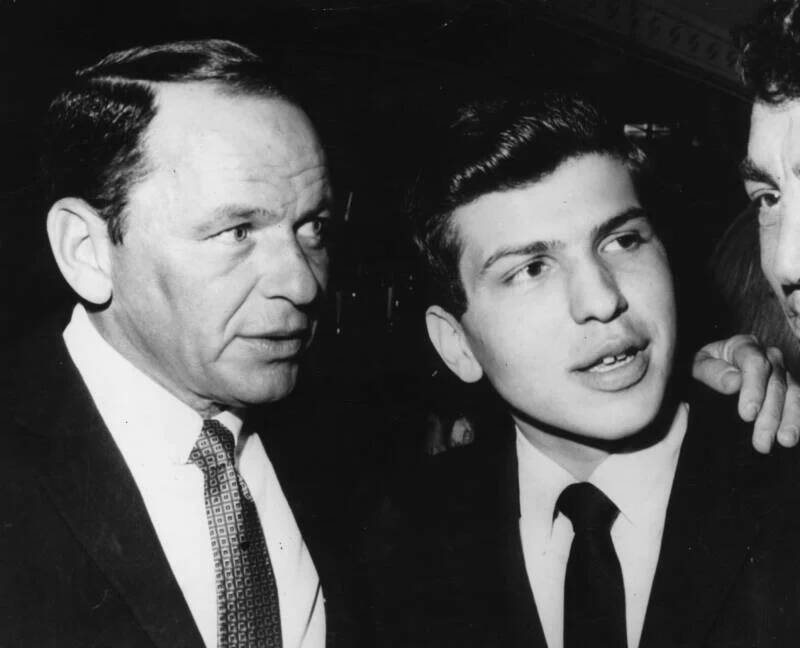
Keystone/Getty ImagesFrank Sinatra Jr. with his father on Dec. 11, 1963, the day he was released from his kidnappers.
Keenan and Amsler were sentenced to life in prison plus 75 years, and Irwin was sentenced to 75 years behind bars. However, after undergoing psychiatric evaluations and appealing their sentences, all three ultimately served far less time. Amsler and Irwin were released after three-and-a-half years, and Keenan spent four-and-a-half years in prison.
Incredibly, Keenan went on to make millions of dollars through real estate. That meant that he was soon rubbing elbows with L.A.’s wealthiest citizens — including Frank Sinatra Jr. himself. (However, the Washington Post reports that the two men never spoke when they crossed paths.)
In the end, Frank Sinatra Jr.’s kidnapping made him famous — but not in the way he’d wanted at the age of 19.
“The criminals invented a story that the whole thing was phony,” he told The Guardian in 2012. “That was the stigma put on me.”
After reading about the botched kidnapping of Frank Sinatra Jr., go inside the true story of the John Paul Getty III kidnapping. Then, learn about the 1974 abduction of newspaper heiress Patty Hearst.





